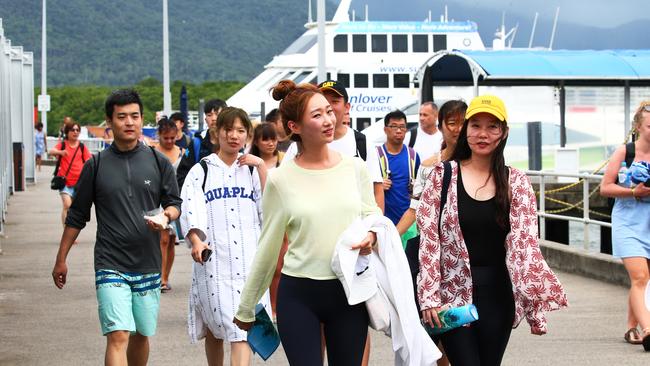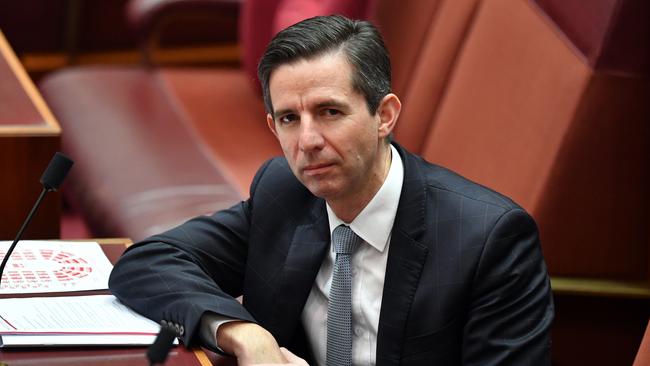Minister slams China’s racism claim, travel warning
The Trade Minister has rejected China’s accusation of racist danger for Chinese but some media in China have hit back.

Trade Minister Simon Birmingham has rejected China’s accusation of Australians attacking Chinese people during the coronavirus pandemic. But Chinese media have hit back at Senator Birmingham’s response to China’s travel warning by citing racial incidents reported in Australian media.
The Trade Minister on Saturday rejected China’s assertions of increasing racial discrimination and violence against Chinese and Asians in Australia in connection with the COVID-19 pandemic, saying it “has no basis in fact”.
But Guancha.cn, a popular publication backed by the Chunqiu Shanghai Institute of Strategic Studies, said in a commentary: “In fact, the ‘base’ that Mr Birmingham couldn’t see actually came from Australian media.’’ The article has also been republished by state media the Global Times.
“Over the past few months, the media in the country have repeatedly exposed all kinds of discriminations targeting ethnic Chinese, even Asians, due to the coronavirus epidemic,’’ it said.
“However, Australia’s current laws cannot adequately protect the victims.”
The paper listed a series of apparent race-related attacks in Melbourne, Sydney, Brisbane and Tasmania that have been reported by Australian media, including an incident reported by the ABC in which a Chinese Australian family in Melbourne were targeted by vandals for two nights in a row, leaving their garage covered in graffiti saying “COVID-19 China Die”.
China’s Ministry of Culture and Tourism has advised the public to avoid travelling to Australia, citing racial discrimination and violence against Chinese people in connection with the COVID-19 pandemic.
“There has been an alarming increase recently in acts of racial discrimination and violence against Chinese and Asians in Australia, due to the impact of the COVID-19 pandemic,” the ministry said in a statement on Friday evening. It did not give any specific examples of such discrimination or violence.
Senator Birmingham said on Saturday: “We reject China’s assertions in this statement, which have no basis in fact.
“Our rejection of these claims, which have been falsely made by Chinese officials previously, is well known to them.”
He said it was unfortunate that Australia had to close its borders with China to protect the country from COVID-19 as it spread from Wuhan.

“This decision was criticised by the Chinese government at the time, but it proved to be a critical decision in keeping Australians safe from the devastation faced by much of the rest of the world,” he said. “Australia is enjoying world leading success in suppressing the spread of COVID-19 and, when the health advice allows, we look forward to again welcoming visitors from all backgrounds to our safe and hospitable nation.”
In a sudden and strongly-worded “travel safety reminder” overnight, China officially warned its people not to travel to Australia due to the risk of racial attack.
The statement issued by China’s Ministry of Culture and Tourism has been trending on Chinese social media since Friday.
“The Ministry of Culture and Tourism reminds Chinese tourists to enhance their safety awareness and do not travel to Australia,” the warning reads.
The warning came at a time of ongoing tension between the two nations, including China’s trade retaliation over the Morrison government’s push for a global inquiry into the origin and spread of the coronavirus.
It also coincided with the launch of the Inter-Parliamentary Alliance on China, which is made up of 18 high-profile lawmakers from nine countries, including Australian politicians, to urge a tougher stance on the Chinese Communist government.
The message was well received on the Chinese social media platform Weibo.
According to Tourism Australia, in 2019, China was Australia’s largest inbound market for visitor arrivals and largest market for total spend and visitor nights, contributing about $12 billion to the economy.
Until now, the overall Australia tourism sector has enjoyed positive engagement on Chinese social media.
With agencies



To join the conversation, please log in. Don't have an account? Register
Join the conversation, you are commenting as Logout